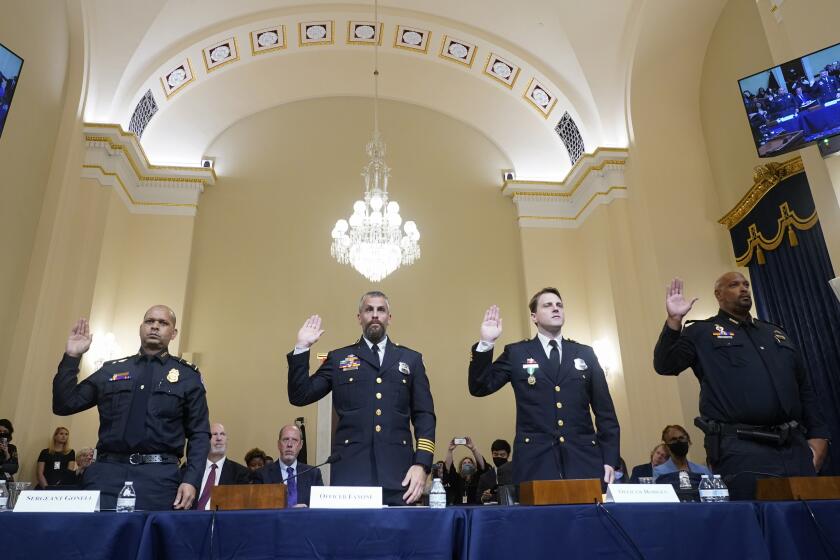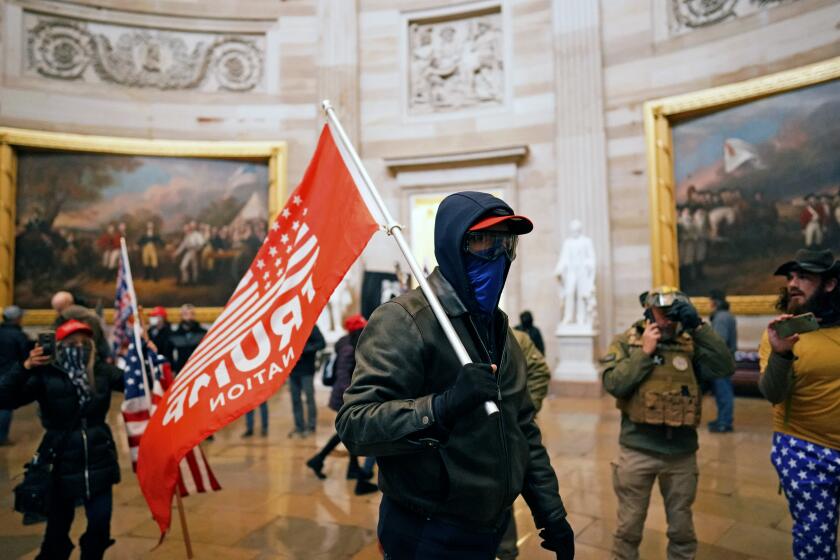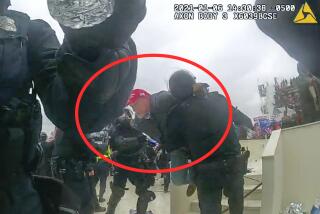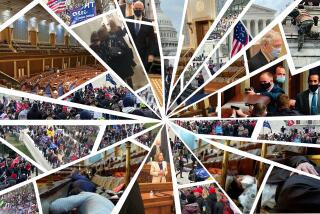Capitol officer at Jan. 6 hearing: ‘I could have lost my life that day ... many times’

Officers relive the hours-long fight with rioters in testimony to the House committee investigating the Jan. 6 Capitol attack.
Four Capitol and Metropolitan Police Department officers on Tuesday recounted their experience fighting off the Jan. 6 insurrection at the U.S. Capitol during the first hearing of a new House committee investigating the attack.
“I recall thinking to myself, this is how I’m going to die, defending this entrance,” U.S. Capitol Police Sgt. Aquilino Gonell said. “I could have lost my life that day, not once, but many times.”
Dressed in uniforms, the officers struggled at times to deliver the emotional testimony and graphic descriptions.
At one point during a video presentation, D.C. Metropolitan Police Officer Michael Fanone placed his hand on Gonell’s shoulder and whispered in his ear. Others dabbed their eyes with tissues, cleared their throats repeatedly and paused to drink water throughout their testimony.
Four Capitol and Metropolitan Police Department officers on Tuesday recounted their experience fighting off the Jan. 6 insurrection at the U.S. Capitol.
Gonell said he was more scared on Jan. 6 than he was during his Army tour of duty in Iraq. He said when he arrived home at 4 a.m. on Jan. 7, he could not even hug his wife because his uniform was so soaked in chemical irritants he had been sprayed with.
Less than four hours later he was back at work. He faces multiple surgeries from injuries to his shoulder, legs and feet, and at least a year of rehabilitation.
Tuesday’s hearing, which was meant to set the tone for what is expected to be a months-long investigation, focused primarily on the officers and what they experienced fighting off the melee for several hours. Some Republicans, including former President Trump, have sought to cast the event as a largely peaceful protest that got out of control.
“Even though there is overwhelming evidence to the contrary, including hours and hours of video and photographic coverage, there is a continuous and shocking attempt to ignore or try to destroy the truth of what truly happened that day and to whitewash the facts,” Gonell said.
Speaking for more than three hours, officers discussed seeing protesters carrying knives and metal batons, and breaking apart barricades to use the pieces as weapons. They recounted people in the crowd trying to gouge out the officers’ eyes, calling them traitors and beating them with poles carrying American flags. They recalled watching officers keep fighting the rioters despite concussions and broken bones, being shocked with cattle prods and sprayed with wasp and bear spray.
Capitol Police Officer Harry Dunn said he received no warning of a threat from the chain of command when he took his post Jan. 6.
“We expected any demonstrators to be peaceful expressions of 1st Amendment freedoms, just like the scores of demonstrations we had observed for many years,” Dunn said.
Hours later, after hearing repeated racial slurs from the mob, Dunn, who is Black, recalled helping to perform CPR on one of the attackers, fighting to save her life in House Majority Leader Steny H. Hoyer’s office.
Before Jan. 6, “no one had ever called me a ‘n—’ while wearing the uniform of a Capitol Police officer,” he said.
On Tuesday he pleaded with colleagues to get therapy and urged the panel to make sure help is available for struggling officers.
“More than six months later, Jan. 6 isn’t over for me,” he said.
The officers said they didn’t fire their weapons Jan. 6 because they were so outnumbered and thought it would cause armed people in the crowd to begin firing.
“If that turned into a firefight, we would have lost, and this was a fight we couldn’t afford to lose,” Metropolitan Police Officer Daniel Hodges said. Video of Hodges screaming for help while wedged in a door between officers and rioters is one of the most widely seen videos from the attack.
Rep. Stephanie Murphy (D-Fla.), a committee member, said she had been hiding in an office 40 feet from the tunnel entrance that Hodges and Fanone defended and could hear the fighting and the officers’ screams.
“You were our last line of defense,” she said. “I shudder to think what would have happened had you not held that line.”
Fanone was pulled into the crowd, where he suffered a heart attack after being beaten and shocked with a stun gun repeatedly at the base of his skull. He recalled tussling with rioters over his weapon as some yelled, “Kill him with his own gun!” before some people in the crowd finally intervened when he screamed to them that he had children.
Fanone and the other officers urged Congress to perform an in-depth investigation into the riot.
“What makes the struggle harder and more painful is to know so many of our fellow citizens — including so many of the people I put my life at risk to defend — are downplaying or outright denying what happened,” Fanone said. “I feel like I went to hell and back to protect them and the people in this room, but too many are now telling me that hell doesn’t exist, or that hell actually wasn’t that bad.
“The indifference shown to my colleagues is disgraceful,” Fanone said, raising his voice to a shout and slamming his fist down on the table.
The House created the committee to investigate the attack after Senate Republicans blocked the creation of a nonpartisan independent commission. House Republican leaders declined to participate in the committee when Speaker Nancy Pelosi (D-San Francisco) rejected two representatives picked by Minority Leader Kevin McCarthy (R-Bakersfield).
Pelosi said that comments from the two — Reps. Jim Jordan (R-Ohio) and Jim Banks (R-Ind.) — supporting Trump’s lie that the election was stolen and downplaying the riot would compromise the integrity of the investigation.
Senate Republicans use the filibuster to block a Jan. 6 commission on the pro-Trump Capitol riot. Here are the questions that may go unanswered as a consequence.
At a news conference before the hearing, Republicans accused Pelosi of blocking the two members because she feared they would ask tough questions, saying the investigation is a sham with a preset outcome.
“Nancy Pelosi bears responsibility as speaker of the House for the tragedy that occurred on Jan. 6,” said the third-most powerful House Republican, Elise Stefanik of New York.
Pelosi named two Republicans to the committee, Reps. Liz Cheney of Wyoming and Adam Kinzinger of Illinois. Both stressed Tuesday that the investigation cannot be political.
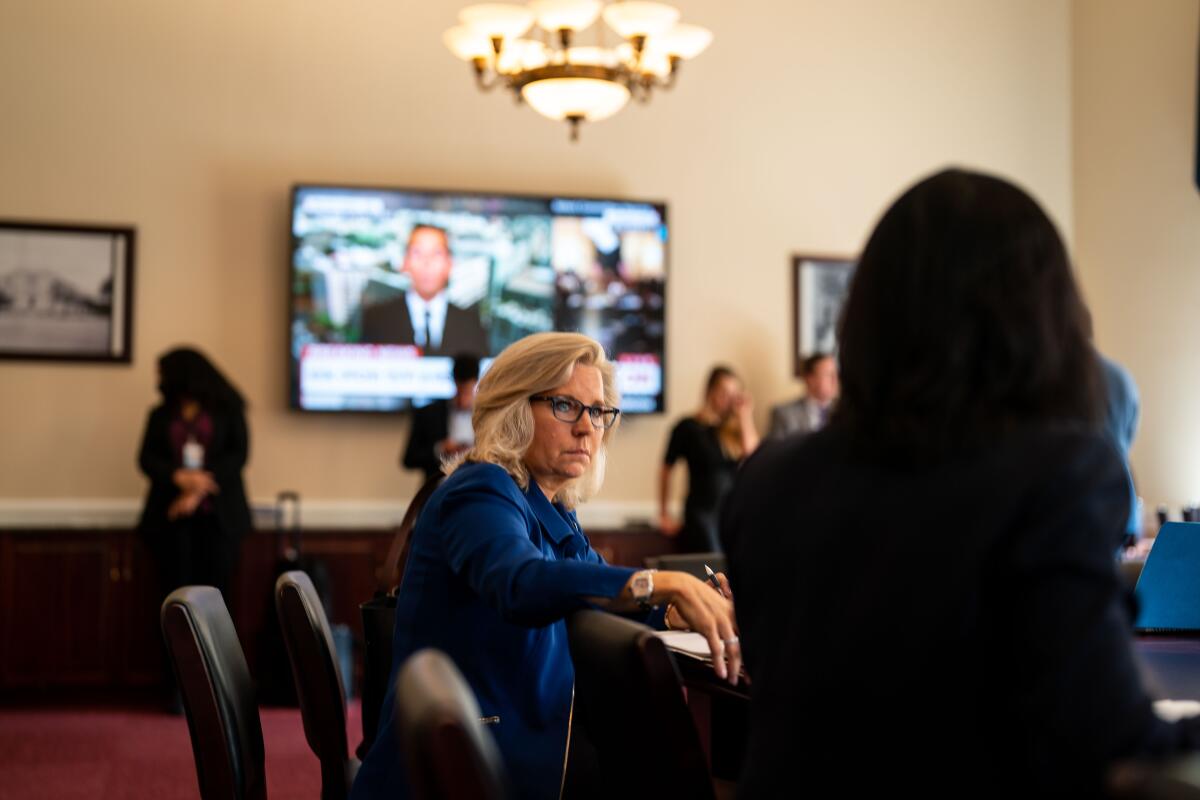
Cheney said at Tuesday’s hearing that not investigating the Jan. 6 attack would leave a cancer that would reappear every four years and threaten the peaceful transfer of power between presidents.
“Until Jan. 6 we were proof positive for the world that a nation conceived in liberty could long endure. But now Jan. 6 threatens our most sacred legacy,” she said.
Cheney said the question for Congress and every American is: “Do we hate our political adversaries more than we love our country and revere our Constitution? I pray that is not the case.”
The committee’s next hearing has not yet been set. The Justice Department informed former Trump officials Tuesday that they can give “unrestricted testimony” to the House Oversight and Reform Committee and the Senate Judiciary Committee. But that position differs from Trump’s claims of executive privilege and the issue will probably end up in court, if such witnesses are called to testify.
The Jan. 6 melee sent lawmakers and Vice President Mike Pence fleeing to safe rooms and briefly delayed the certification of President Biden’s win in the electoral college.
The committee has been instructed to examine what occurred before the attack, including if white supremacist groups coordinated the attack and what the Trump administration might have known in advance, how Trump’s repeated lies about the election may have inspired rioters, and what intelligence failures caused police to be underprepared and allowed attackers to occupy and ransack the country’s legislative seat of power for several hours.
At least 140 officers were injured — some permanently — and five people died either in the melee or in the hours after, including a police officer.
Two other officers died by suicide in the days after the attack. Damage estimates exceed $1 million.
More to Read
Get the L.A. Times Politics newsletter
Deeply reported insights into legislation, politics and policy from Sacramento, Washington and beyond. In your inbox three times per week.
You may occasionally receive promotional content from the Los Angeles Times.

